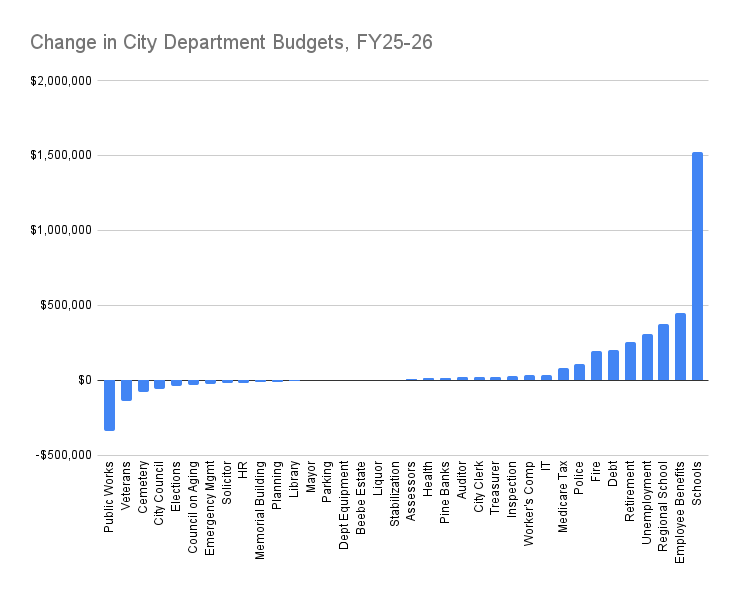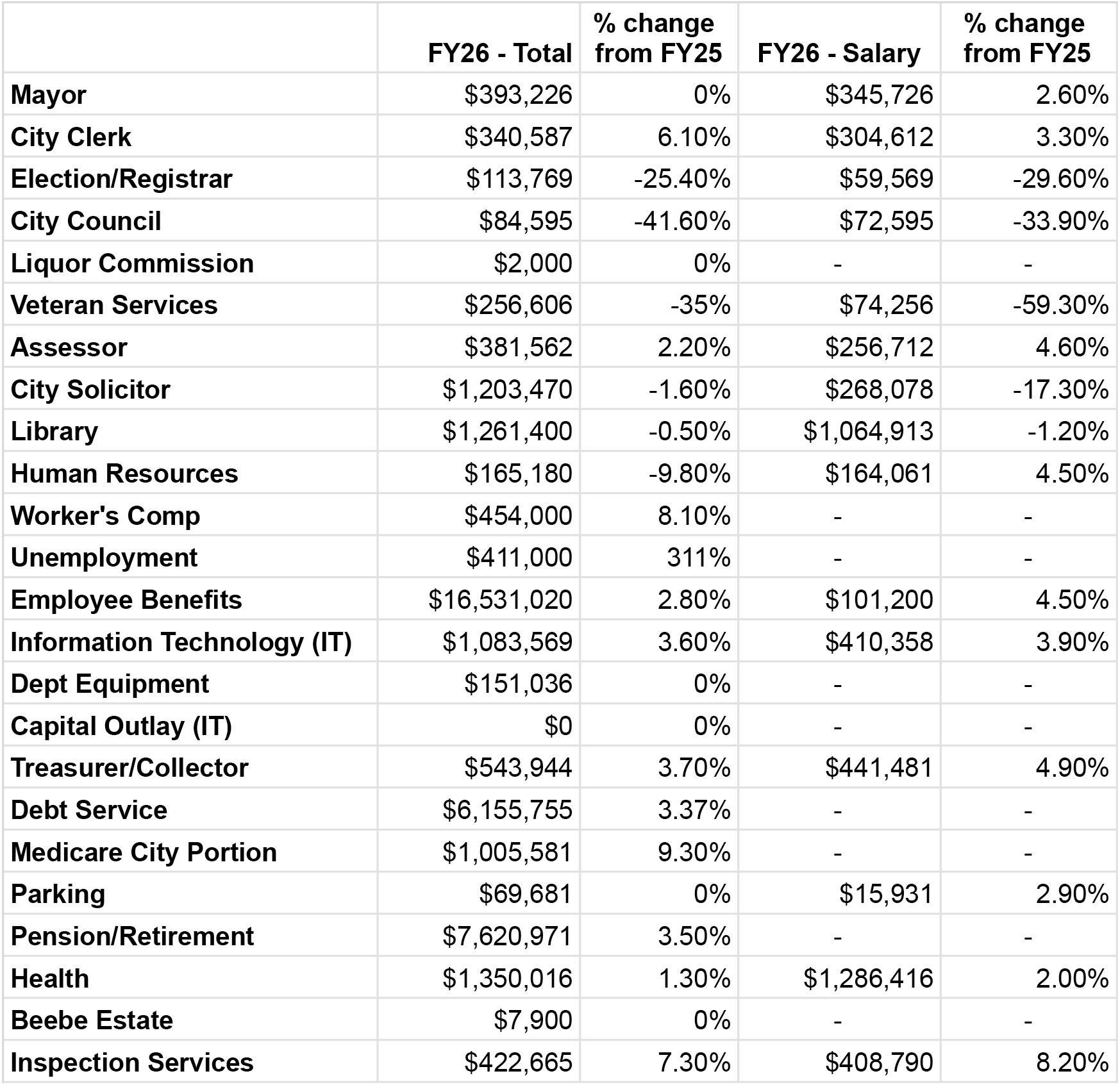City Council Hears From First Round of Departments On Next Year’s Budget
By Ellen Putnam

Over the last two weeks, as part of their budget process, the Appropriations and Oversight Committee of the City Council has heard from Mayor Jen Grigoraitis and several department heads about their planned budgets for Fiscal Year 2026 (FY26), which starts in July.
The City Council’s role in the budget process is to approve, reject, or reduce a department’s budget; they cannot add or rebalance budget lines. The Appropriations Committee will continue to hold budget hearings twice a week through the second week of June, at which point the City Council will vote on next year’s budget as a whole.
Of the departments that have been presented so far, the Veterans’ Services office will see the largest total budget cuts, largely due to restructuring within the office.
For over a decade, Melrose has been part of the Melrose-Wakefield-Saugus Veterans’ Services District. The district is led by a full-time director who is based out of Melrose, and Melrose veterans are supported by a part-time Veterans’ Services Officer (VSO) and a part-time administrative assistant.
The office serves a number of functions to support local veterans, including distributing Chapter 115 benefits to indigent veterans, assisting veterans with navigating Veterans Administration benefits, and helping veterans access other social services and supports. They also support veterans who are food insecure with a monthly food mart.
Earlier this spring, Wakefield voted to withdraw from this district at the end of June, leaving Melrose and Saugus to decide either to form a different district or to run their Veterans’ Services on their own. Melrose has chosen to restructure the department to serve Melrose alone, resulting in some significant budget cuts within the department for Fiscal Year 2026 (FY26), which starts in July.

Total change in each department from FY25 to FY26
More budget information can be found here
Specifically, the department will shift from its current staff of three to a single, full-time VSO. The position will be posted as a new vacancy, although the department’s current staff may apply for the position. Along with salary reductions that will come from reducing three positions down to one, the Education and Seminars, Mileage, and Rental of Quarters budget lines will all be reduced or eliminated due to reduced need for these expenses with a single employee who will be fully based at the Milano Center.
“You know, it seems like it’s a reduction in spending, but we will probably also see a reduction in service,” Chief of Staff Lauren Grymek told the City Council, “because instead of having three people sitting in the office in the Milano Center, we will have one. And although that person will be dedicated just to Melrose, they’ll be expected to continue doing all of the things that Melrose has always done.”
And as is true for many aspects of the city and schools, Veterans’ Services may increasingly rely on volunteers to run what Grymek referred to as “the nice-to-haves, as opposed to the need-to-haves.” “We want to make sure that this person can deliver the things that veterans need the most,” Grymek went on, “so the things like the food drives, the monthly food mart - we’re hoping to keep those in, but to rely more on the Veterans’ Services Advisory Board” - the volunteer board that assists the Veterans’ Services office with events like Memorial Day and Veterans Day observances - “to help fill in some of that volunteer gap.”
The city’s FY26 budget also reflects a reduction of 12.5% in Chapter 115 benefits, “to best reflect the anticipated need of veterans eligible to receive these benefits, and based on previous years’ utilization,” the department’s budget memo noted. Cities and towns are required by law to pay Chapter 115 benefits to resident veterans who qualify, although the state reimburses approximately 75% of the benefits distributed by each municipality.
“There’s a reduction in the line item to be in line with the number of veterans that we’re serving,” noted Grymek. “Unfortunately, some pass away or in some circumstances they move on to federal-level programs. So this reduction is reflective of our current spending - about $13,000 a month on the veterans that we have.”

The other departments that presented their budgets last week will see less significant funding changes, although cuts are being made across the city in an effort to close a $2.1 million budget gap on the city side of the budget.
Several departments will see a reduction in education and training, which allows employees to keep up their professional licenses and stay up-to-date on best practices. The heads of the Assessor’s office and the Inspectional Services Department each expressed concern that cuts to education might begin to make it challenging for members of their departments to maintain their licenses.
The Mayor’s Office will also see a reduction in professional services, which allows for things like an audit of the employee handbook or a harassment training for managers - “those things that can tend to be overlooked over time,” Grymek noted.
Several departments will see a reduction of hours for their administrative assistants or the elimination of assistant positions, which shifts more administrative tasks and constituent services onto more senior department staff.
And the elimination of the mayor’s community outreach budget will shift more of the responsibility for community events and traditions like the kindergarten welcome night onto volunteers and community sponsors. “We’ve been talking to folks who those events are really important to,” said Grymek, “to see if they might be able to stand up some of these events. The kindergarten welcome, in particular, we know a lot of people look forward to.”

The Melrose Public Library will see the reduction of one full-time staff member, although the city is limited in the number of cuts that can be made to the library - if too many functions or hours are cut, the library could lose certification. That would mean that the city would be responsible for repaying its $8 million grant from the Massachusetts Board of Library Commissioners for the new library building.
“I had hoped that, at this exciting time, we would be talking about an aspirational budget that would fully fund the library in a way that allows us to maximize the advantages of a building that we now have,” said Library Director Linda Gardener. “Instead, we are looking at a challenging year where a full-time position will be left vacant and the hours that we are open to the public will be reduced.”
The library will receive some budgetary assistance from the Board of Library Trustees and the Friends of the Melrose Public Library, which can help with costs such as purchasing books and periodicals, but, said Gardener, “they cannot fix the budget entirely and erase the challenges that we’re facing.”
The Health and Human Services Department will shift the role of the Prevention and Wellness Coordinator to be funded entirely by opioid mitigation, which means, according to department head Anthony Chui, “we’re losing some of the community health work that she was doing. She was specifically focused on age-friendly work, and now her focus will be mostly on opioids and substance use prevention.”
Alongside these cuts, a number of departments will see rising salary costs. This is due not to hiring additional staff, but to contractual raises required for unionized staff members, which includes most city employees.

Percentage change in total budget and salary costs for each department that has been presented to the City Council so far
More budget information can be found here
Several other budget areas, largely those that are mandated by law or by contract, saw significant increases this year.
Property insurance on municipal buildings (including schools), which is housed in the City Solicitor’s budget, increased 4.4% this year, in part because of the added cost of insuring the new library building.
Pension costs rose by 3.5%, which, the city’s Chief Financial Officer Kerri Golden explained, is required by law: Melrose must ensure that, by 2040, its pension system, which is available to all city employees who work over 20 hours per week and don’t qualify for a state pension, is fully funded. Between now and 2040, the amount Melrose must spend on its pension system each year will steadily rise from the current $7.6 million to $13.5 million.
The costs for Employee Benefits also increased, largely due to rising costs for plans administered by the Group Insurance Commission, which provides health insurance for all city employees who work 20 hours or more hours per week. Rates for these plans have increased by 12.9% on average this year, although the total cost for the city has risen only 3.1%. This is largely due to the elimination of over 50 positions across the Melrose Public Schools and the rest of city government.
At the same time, the city’s unemployment costs have risen over 300%. “I’m sure that you’re seeing this percentage and it’s shocking,” said Polina Latta, the head of Human Resources, “but this is the fiscal reality of the proposed layoffs.”
Some budget items increased in an effort to bring them in line with what is actually spent on them each year. Workers’ Compensation benefits, for instance, increased by 17%. “Pretty much every year I come to you around this time asking for more money in this area,” said Latta, “so we decided to increase the benefits line.” $175,000 of the benefits line is allocated to three long-term benefits recipients, Latta explained. This had left relatively little room on that budget line for other claims, which can be numerous - this year, 105 claims were filed.
City Council members noted that budgeting precisely, especially for smaller expenses like printing, can be challenging, as those costs can fluctuate from year to year. “It’s better to err on the side of not running out,” reflected City Councilor Kim Vandiver, “because the downside of running out is you run into a hard stop where suddenly we can’t perform a function. I wouldn't want to cut too far into something that might leave us high and dry on something essential, especially when anything extra is going to come back in as free cash.”
The Appropriations Committee will hold their next budget hearing on Tuesday, May 27th. At that meeting, they will hear from the Department of Public Works, where almost $500,000 in cuts are expected for next year.

Follow Us: